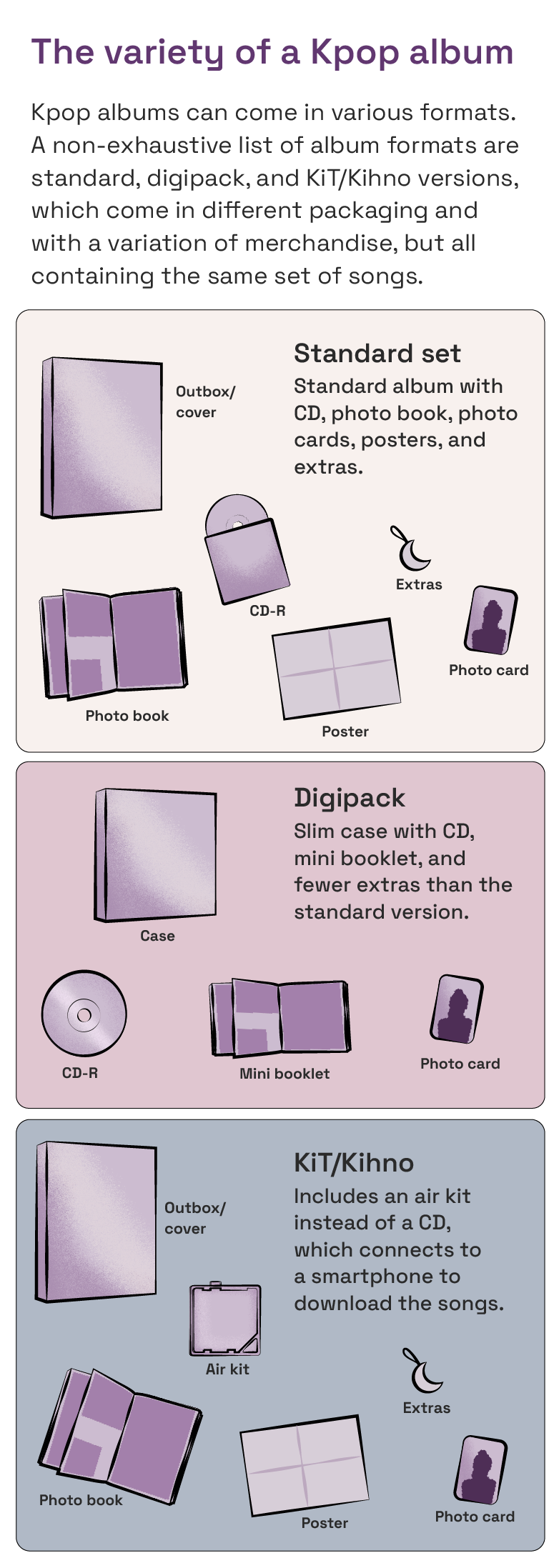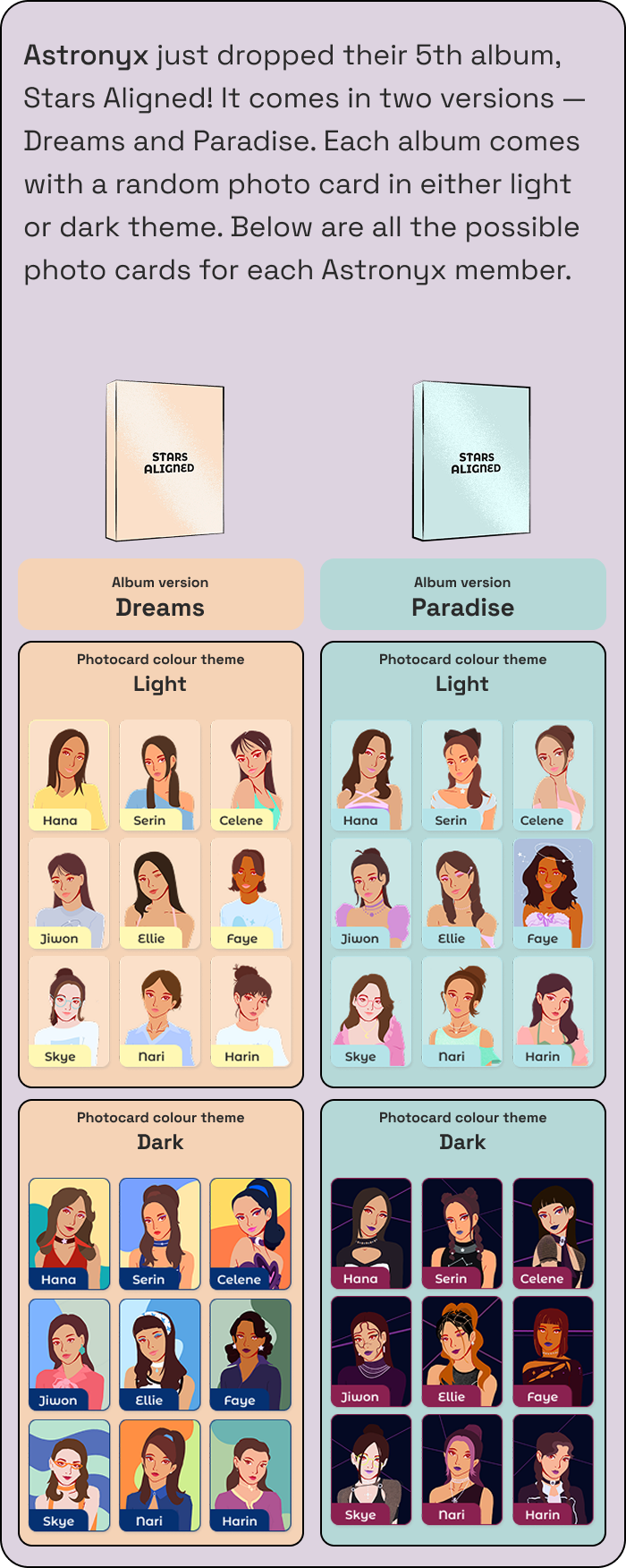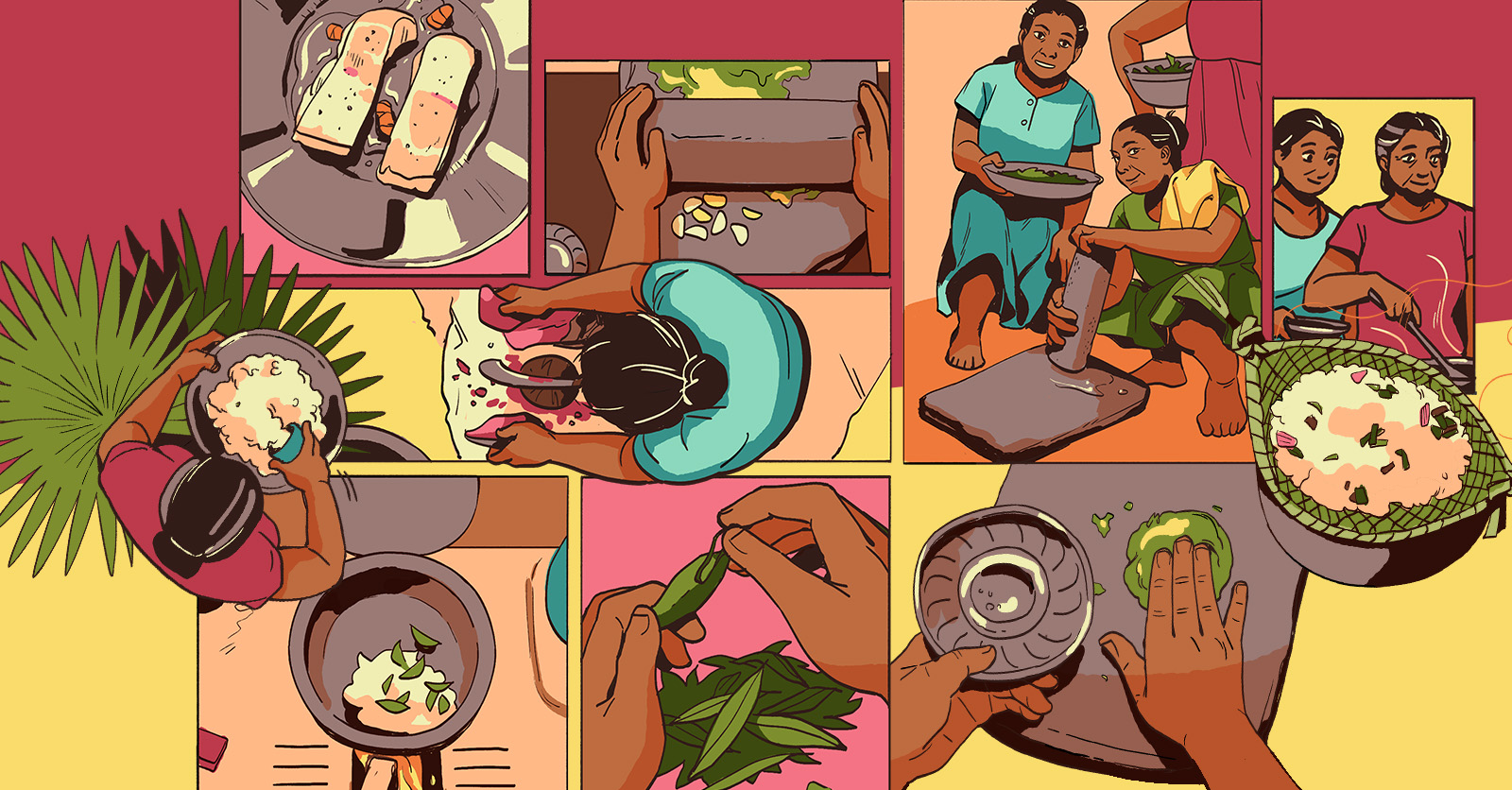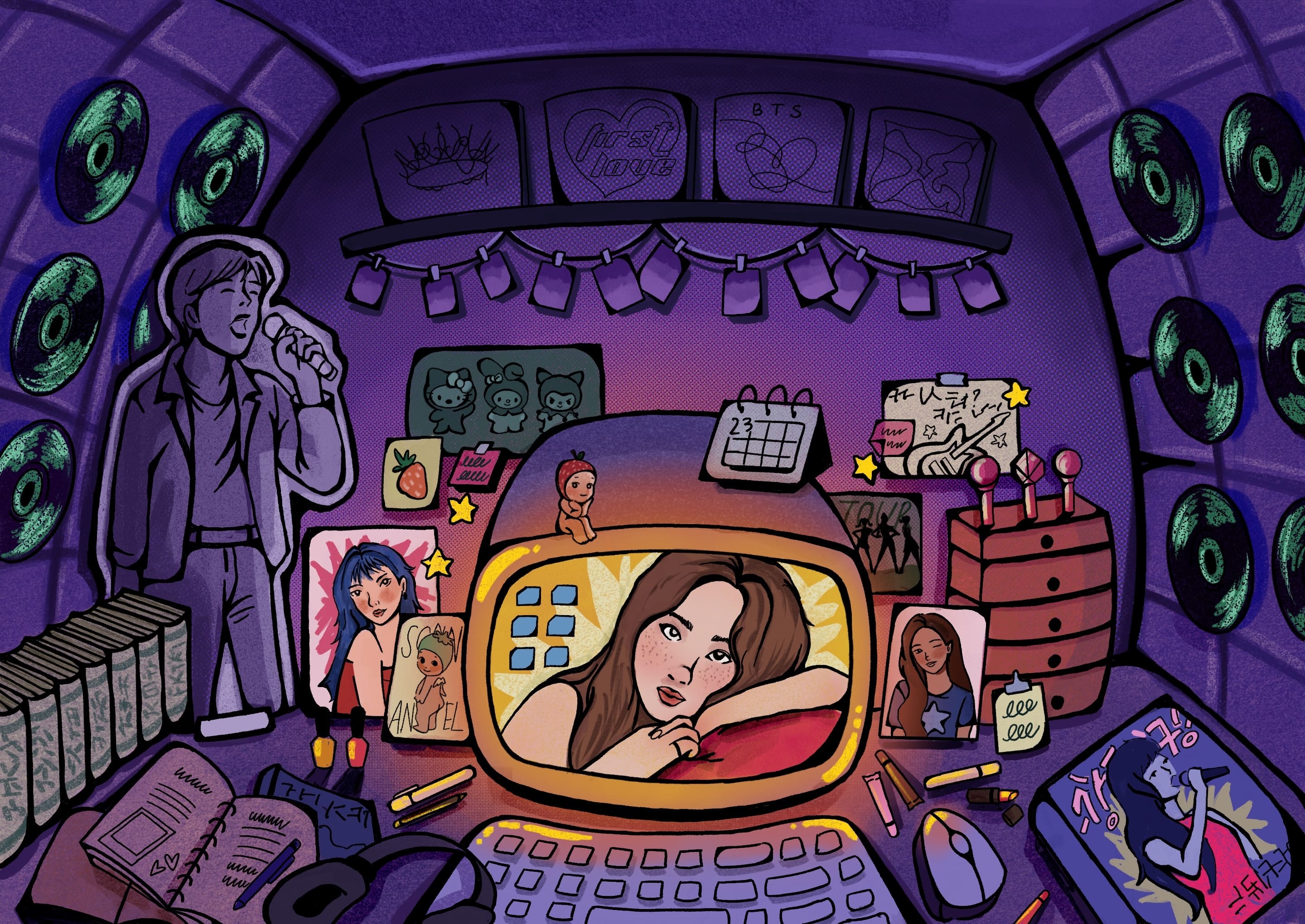The Physical Phenomenon
Why CDs are still well-loved in Kpop
by Gwyneth ChengIn the age of digital streaming, how does the Korean pop music industry still profit massively from physical albums?
Remember the golden age of CDs? When you’d pick up your favourite artist’s latest album, read through the lyric book, and savour the music through your wired earphones. In the sparkling digital age of Spotify and Apple Music, this has become a distant memory. Physical albums are now much less desirable. CD sales also no longer determine an album’s success.
Unless… it's Kpop. True to its nature of defying expectations, the ever-popular Korean pop (Kpop) music industry remains the outlier. Korean music agencies still profit from selling physical albums in the millions. Physical album sales are still essential determinants for an artist’s chart performance, their chances of winning awards, and their overall success.
It’s curious—with digital streaming being all the rage globally, how is the Kpop industry bucking the trend?
Unless… it's Kpop. True to its nature of defying expectations, the ever-popular Korean pop (Kpop) music industry remains the outlier. Korean music agencies still profit from selling physical albums in the millions. Physical album sales are still essential determinants for an artist’s chart performance, their chances of winning awards, and their overall success.
It’s curious—with digital streaming being all the rage globally, how is the Kpop industry bucking the trend?
What determines “popularity” in Kpop?
The performance of a newly released Kpop album is determined by two main factors: the number of times its songs are streamed digitally, and the number of overall album sales.
Digital streaming counts the most towards charting performance, and contributes to end-of-year recognitions such as Song of the Year awards. On the other hand, album sales contribute to prestigious end-of-year Album of the Year awards. Fans also strive to break records for the first-week sales, known as “chodong”, of each album release. When artists break their own records, or the overall industry record, it is a big indication of their popularity and fanbase strength.
It’s not just about the big awards. The industry has weekly music programmes like Inkigayo, Show Champion, and Music Bank where artists get to perform their latest songs. There’s a song ranking at the end of every episode which depends on digital streaming and physical sales numbers. Artists whose songs reach the top spot get a trophy, and the more times a song hits number 1, the more popular it is implied to be.
Digital streaming counts the most towards charting performance, and contributes to end-of-year recognitions such as Song of the Year awards. On the other hand, album sales contribute to prestigious end-of-year Album of the Year awards. Fans also strive to break records for the first-week sales, known as “chodong”, of each album release. When artists break their own records, or the overall industry record, it is a big indication of their popularity and fanbase strength.
It’s not just about the big awards. The industry has weekly music programmes like Inkigayo, Show Champion, and Music Bank where artists get to perform their latest songs. There’s a song ranking at the end of every episode which depends on digital streaming and physical sales numbers. Artists whose songs reach the top spot get a trophy, and the more times a song hits number 1, the more popular it is implied to be.
How international fans show support
Since the days of H.O.T. and BoA to today’s BTS, Blackpink, and more, Kpop has boomed into a global phenomenon, loved and listened to all over the world. Many Kpop artists have considerable international fanbases, who tend to be as dedicated as local fans.
But unlike the locals, international fans are limited when it comes to contributing to their favourite artists’ popularity through streaming their music online. This is because streaming numbers that contribute the most to charting performance and awards don’t come from international music platforms like Spotify, but from local streaming sites such as MelOn, Genie, FLO, and Bugs. To create an account on these sites, users typically need a Korean phone number.
This effectively cuts off a major route of support for international fans. Most of them thus shift their focus towards boosting physical album sales instead.
In theory, this wouldn’t be much of an issue if fans bought one album each. But the reality is that fans tend to buy more than one copy of the same album, a behaviour that is strongly encouraged by entertainment agencies and the “lottery-like” marketing tactics that they employ.
But unlike the locals, international fans are limited when it comes to contributing to their favourite artists’ popularity through streaming their music online. This is because streaming numbers that contribute the most to charting performance and awards don’t come from international music platforms like Spotify, but from local streaming sites such as MelOn, Genie, FLO, and Bugs. To create an account on these sites, users typically need a Korean phone number.
This effectively cuts off a major route of support for international fans. Most of them thus shift their focus towards boosting physical album sales instead.
In theory, this wouldn’t be much of an issue if fans bought one album each. But the reality is that fans tend to buy more than one copy of the same album, a behaviour that is strongly encouraged by entertainment agencies and the “lottery-like” marketing tactics that they employ.
The randomisation of album and merchandise sales
You might have seen an “unboxing video” of a Kpop album, which is a popular way to showcase the contents of a product one just bought or received. These are more than just plastic cases containing a single CD.
A Kpop album typically includes a photo book, photo cards, and themed stickers. Depending on the album you purchased, you could also get posters, postcards, notebooks, craft kits, temporary tattoos, keyrings, bookmarks, and more.
These albums are also tickets to win opportunities to attend “fan meetings” where you can have a conversation with the artist either through a video call or in person. The more albums you buy, the higher your chances are of winning.
A Kpop album typically includes a photo book, photo cards, and themed stickers. Depending on the album you purchased, you could also get posters, postcards, notebooks, craft kits, temporary tattoos, keyrings, bookmarks, and more.
These albums are also tickets to win opportunities to attend “fan meetings” where you can have a conversation with the artist either through a video call or in person. The more albums you buy, the higher your chances are of winning.

Illustration of typical album contents
While meeting the artists up close is highly coveted, the truly precious items are, surprisingly, the small photo cards that come with every album.
Think about the baseball or Pokémon cards that enthusiasts love to collect. Photo cards—high quality, limited edition items that feature unique selfies of individual idols—are the equivalent to a Kpop fan.
Collecting these cards is a hobby, often enjoyed because of the feelings of community with other like-minded fans. It’s also driven by the desire to collect goods that are limited-edition. Whether kept in an album, displayed in one’s room, or placed in a cute card sleeve keychain hung on a bag, it also creates an emotional connection between fan and artist. Since photo cards are different with every album release, they also represent the milestones of an artists’ career, and fans who collect these mementos have a record of their journey as part of a Kpop fandom.
But how do fans get the photo card they want? They have to rely on pure luck.
Here’s how it works. Kpop albums regularly come in different versions. Sometimes it is a thematic variant, like a “Day” and “Night” concept. It could also be a member-based variant if the act is a group, where there is an album version for each member. Sometimes, it’s both—for instance, there is a version for each member, and each member has a “Day” and “Night” version.
Think about the baseball or Pokémon cards that enthusiasts love to collect. Photo cards—high quality, limited edition items that feature unique selfies of individual idols—are the equivalent to a Kpop fan.
Collecting these cards is a hobby, often enjoyed because of the feelings of community with other like-minded fans. It’s also driven by the desire to collect goods that are limited-edition. Whether kept in an album, displayed in one’s room, or placed in a cute card sleeve keychain hung on a bag, it also creates an emotional connection between fan and artist. Since photo cards are different with every album release, they also represent the milestones of an artists’ career, and fans who collect these mementos have a record of their journey as part of a Kpop fandom.
But how do fans get the photo card they want? They have to rely on pure luck.
Here’s how it works. Kpop albums regularly come in different versions. Sometimes it is a thematic variant, like a “Day” and “Night” concept. It could also be a member-based variant if the act is a group, where there is an album version for each member. Sometimes, it’s both—for instance, there is a version for each member, and each member has a “Day” and “Night” version.

what's in a typical kpop album
Within each album version, there will be a photo card for a member of the group, but this member is usually randomised. Even if you get the artist you want, also known as your “bias”, there could be two different versions of photo cards of the same person.
Each Kpop album typically contains about one to five photo cards.
For a fan who wants to collect specific cards, it means having to buy several versions of the same album. There is no other way to definitively get the specific card they want from the open market.
Each Kpop album typically contains about one to five photo cards.
For a fan who wants to collect specific cards, it means having to buy several versions of the same album. There is no other way to definitively get the specific card they want from the open market.

Of course, randomisation built into obtaining merchandise is not a new concept—think loot boxes in video games, or blind boxes for collectable toys. However, in this case, this behaviour boosts the sales numbers of Kpop albums globally, allowing the Kpop industry to profit heavily. In 2023, more than 119 million physical copies were sold, which was a three-fold increase from the amount sold in 2020.
The consequences of overconsumption
To feed the high demand the industry fuels, albums are produced in massive amounts. This results in extremely high resource requirements.
Producing a single CD generates an estimated 500 grams of carbon emissions. Doesn’t sound like much? Picture a famous Kpop group with a diehard international fanbase. Producing CDs for a week’s worth of sales could create emissions levels roughly “equivalent to flying around the Earth 74 times”, estimates environmental group Kpop4Planet.
This number doesn’t yet include the emissions generated by shipping these albums to fans around the world, who often comprise the bulk of buyers.
Producing a single CD generates an estimated 500 grams of carbon emissions. Doesn’t sound like much? Picture a famous Kpop group with a diehard international fanbase. Producing CDs for a week’s worth of sales could create emissions levels roughly “equivalent to flying around the Earth 74 times”, estimates environmental group Kpop4Planet.
This number doesn’t yet include the emissions generated by shipping these albums to fans around the world, who often comprise the bulk of buyers.
Most of these resources quickly go to waste, literally. A large proportion of fans are buying the album for the merchandise, not the CDs. A 2016 survey of 1,200 Koreans between 10 and 59 years old found that more than 70 percent of respondents don’t listen to music on CDs, instead preferring alternative mediums such as smartphones, televisions, computers, and radio.
For fans that still appreciate listening to music on CDs, they can realistically only listen to one album.
This leads to an unfortunate practice among Kpop fans: bulk buying copies of an album, only to keep the merchandise and give or throw away the extra CDs and album boxes.
For fans that still appreciate listening to music on CDs, they can realistically only listen to one album.
This leads to an unfortunate practice among Kpop fans: bulk buying copies of an album, only to keep the merchandise and give or throw away the extra CDs and album boxes.

Posts and associated comments were based on real Twitter threads as reported in Allkpop and AsiaOne, as well as a post on The Qoo as reported in Hindustan Times.
"No Kpop on a Dead Planet"
While the Kpop agencies have set the rules, it doesn’t mean that dedicated fans are blindly following along.
Kpop4Planet, a climate activist platform, was launched in 2021 by a group of fans who want to advocate against the environmental costs of the industry. In particular, they’ve worked tirelessly to raise awareness about the overconsumption of albums and merchandise. This includes sending official open letters to entertainment agencies and protesting outside their headquarters, creating online petitions, and joining events such as the Plastic Treaty March in Busan, South Korea in 2024.
Under their campaign titled “No Kpop on a Dead Planet”, they gathered more than 8,000 unwanted albums from fans and sent them back to entertainment giants Hybe Corporation, JYP Entertainment, and SM Entertainment to highlight the waste issue.
Most impressively, in December 2021, representatives of Kpop4Planet spoke at the “Sustainable K-Entertainment” conference at the National Assembly of South Korea, on behalf of more than 10,000 fans from 83 countries. They directly called on entertainment agencies to use their resources and influence for good. Kpop4Planet was later offered a spot at the Korean pavilion at the 2022 United Nations Climate Change Conference (COP27), where they further advocated for their cause and encouraged more Kpop fans to join them.
For them, one way of improving the situation is employing the “green album option”, which allows fans to choose how many physical albums out of their total order they actually receive. This means that while the orders still count towards awards and opportunities to attend fan meetings, the amount of albums produced and shipped out would be much less. Other suggestions include providing fans with the option to buy digital versions of the albums and only receive the photo cards.
Apart from Kpop4Planet, fans are also doing what they can to reduce waste, such as trading and reselling photo cards with one another online. However, resold photo cards can become quite pricey—cards can cost up to the thousands, depending on factors such as their rarity, and group and member popularity. This may prevent fans from participating.
Kpop4Planet, a climate activist platform, was launched in 2021 by a group of fans who want to advocate against the environmental costs of the industry. In particular, they’ve worked tirelessly to raise awareness about the overconsumption of albums and merchandise. This includes sending official open letters to entertainment agencies and protesting outside their headquarters, creating online petitions, and joining events such as the Plastic Treaty March in Busan, South Korea in 2024.
Under their campaign titled “No Kpop on a Dead Planet”, they gathered more than 8,000 unwanted albums from fans and sent them back to entertainment giants Hybe Corporation, JYP Entertainment, and SM Entertainment to highlight the waste issue.
Most impressively, in December 2021, representatives of Kpop4Planet spoke at the “Sustainable K-Entertainment” conference at the National Assembly of South Korea, on behalf of more than 10,000 fans from 83 countries. They directly called on entertainment agencies to use their resources and influence for good. Kpop4Planet was later offered a spot at the Korean pavilion at the 2022 United Nations Climate Change Conference (COP27), where they further advocated for their cause and encouraged more Kpop fans to join them.
For them, one way of improving the situation is employing the “green album option”, which allows fans to choose how many physical albums out of their total order they actually receive. This means that while the orders still count towards awards and opportunities to attend fan meetings, the amount of albums produced and shipped out would be much less. Other suggestions include providing fans with the option to buy digital versions of the albums and only receive the photo cards.
Apart from Kpop4Planet, fans are also doing what they can to reduce waste, such as trading and reselling photo cards with one another online. However, resold photo cards can become quite pricey—cards can cost up to the thousands, depending on factors such as their rarity, and group and member popularity. This may prevent fans from participating.
The masterminds behind the system
"I don't think fans should be the target of criticism. [...] As long as the fundamental system encourages them to buy mass amounts, [...] from the fans' perspective, they have no other choice."
— Pop music critic Jung Min-jae, who is a member of the annual Korean Music Awards' selection committee
The nature of the Kpop industry as currently designed is tied to the strong connection fans have with their favourite artists. As a result, the issues of waste and consumerism are often viewed through the lens of the behaviour of fans—think snaking queues in music stores, or rallying members of the fandom to help their favourites reach one million album sales.
But the crux of the issue lies in those who created this system in the first place. The Kpop industry is highly unique and specific in its design. It is innovative and artful—album concepts are often highly creative and appealing, supported by high production values and sophisticated marketing and publicity efforts—but also in some ways archaic, like with the obsession with tying artist popularity to physical CDs in a world where most people don’t have CD players.
Thus, any change must come directly from the root: entertainment agencies adjusting the rules that they’ve helped to set.
That’s not to say they’re not trying. Over the years, faced with increasing scrutiny on these environmental issues, these companies have started using recycled or eco-friendly materials for album production, and have begun releasing annual sustainability reports.
But the crux of the issue lies in those who created this system in the first place. The Kpop industry is highly unique and specific in its design. It is innovative and artful—album concepts are often highly creative and appealing, supported by high production values and sophisticated marketing and publicity efforts—but also in some ways archaic, like with the obsession with tying artist popularity to physical CDs in a world where most people don’t have CD players.
Thus, any change must come directly from the root: entertainment agencies adjusting the rules that they’ve helped to set.
That’s not to say they’re not trying. Over the years, faced with increasing scrutiny on these environmental issues, these companies have started using recycled or eco-friendly materials for album production, and have begun releasing annual sustainability reports.
It’s a good start, but these efforts are heavily focused on making albums more biodegradable—in other words, making them less environmentally damaging when they’re thrown away.
This avoids the fundamental problem, which is the marketing system that prompts fans to bulk buy in the first place. To completely discourage unnecessary consumption, companies should get rid of the link between buying albums and winning spots at fan meetings. Photo cards and other desirable merchandise should be sold separately from albums, and be directly purchasable instead of being randomised.
Kpop4Planet’s stance is that until such marketing tactics are changed, use of eco-friendly materials in album production is equivalent to greenwashing. This is because companies are still driven to generate maximum profits, and despite claims to be more environmentally conscious, they are still pushing fans to buy the same album multiple times.
This avoids the fundamental problem, which is the marketing system that prompts fans to bulk buy in the first place. To completely discourage unnecessary consumption, companies should get rid of the link between buying albums and winning spots at fan meetings. Photo cards and other desirable merchandise should be sold separately from albums, and be directly purchasable instead of being randomised.
Kpop4Planet’s stance is that until such marketing tactics are changed, use of eco-friendly materials in album production is equivalent to greenwashing. This is because companies are still driven to generate maximum profits, and despite claims to be more environmentally conscious, they are still pushing fans to buy the same album multiple times.
Has the South Korean government responded?
Kpop’s album marketing tactics have been debated extensively in South Korea’s Parliament, and the Ministry of Environment has tried to discourage such schemes with penalties.
In 2023, several entertainment agencies were fined about 2 billion KRW, or roughly USD1.4 million. But this is nothing compared to what companies earn—Hybe Corporation alone recorded an annual revenue of 2.18 trillion KRW, roughly USD1.6 billion, in the same year.
Politicians have spoken up about the issue, suggesting that the environment ministry should impose countermeasures such as requiring firms to publish information on albums of how to dispose of them properly.
However, once again, these measures still do not address the foundational problem of a system that encourages bulk buying.
In 2023, several entertainment agencies were fined about 2 billion KRW, or roughly USD1.4 million. But this is nothing compared to what companies earn—Hybe Corporation alone recorded an annual revenue of 2.18 trillion KRW, roughly USD1.6 billion, in the same year.
Politicians have spoken up about the issue, suggesting that the environment ministry should impose countermeasures such as requiring firms to publish information on albums of how to dispose of them properly.
However, once again, these measures still do not address the foundational problem of a system that encourages bulk buying.
We have to slow down consumption
With online shopping, fast fashion, and fads that rise and fall quickly, plastic waste and pollution are a huge issue in this digital era.
In a worrying move, similar marketing tactics are getting picked up outside of the Korean music industry. In 2024, Taylor Swift released 27 physical variants of her album The Tortured Poets Department in the form of CDs, vinyl records, and cassette tapes. Her latest album The Life of a Showgirl released just two weeks ago already has 27 physical variants, with more possibly to come. Charlie XCX’s album Brat, released in the same year, had 26 physical variants, including three as CDs, 22 as vinyls, and one on cassette.
While fans are speaking up and trying their best to rectify the situation, the larger players are moving too slowly and addressing the wrong areas.
For now, we have to consider the consequences of our purchases. Opt for less wasteful options such as trading and buying from secondhand markets. In the meantime, join voices online in demanding for companies to act faster, and better.
In a worrying move, similar marketing tactics are getting picked up outside of the Korean music industry. In 2024, Taylor Swift released 27 physical variants of her album The Tortured Poets Department in the form of CDs, vinyl records, and cassette tapes. Her latest album The Life of a Showgirl released just two weeks ago already has 27 physical variants, with more possibly to come. Charlie XCX’s album Brat, released in the same year, had 26 physical variants, including three as CDs, 22 as vinyls, and one on cassette.
While fans are speaking up and trying their best to rectify the situation, the larger players are moving too slowly and addressing the wrong areas.
For now, we have to consider the consequences of our purchases. Opt for less wasteful options such as trading and buying from secondhand markets. In the meantime, join voices online in demanding for companies to act faster, and better.
Disclaimer: Our stories have been researched and fact-checked to the best of our abilities. Should you spot
mistakes, inaccuracies, or have queries about our sources, please drop us an e-mail at
hello@kontinentalist.com
Credits
Code / Siti Aishah
Design and Illustration / Munirah Mansoor, Shrutti Mittal, Elizabeth Cheong
Editing / Nabilah Said, Zafirah Zein
Recommended Stories









